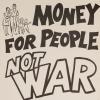This article shows a multitude of arguments that the cost of NGO
and business registration should be set to zero.
It also aims to set to zero the cost of things such as:
- business and nonprofit registration and liquidation
- opening bank accounts and receiving credit cards
- going to a bursa
- defending a case in court
- setting a merchant account in Internet
- etc.
and also promote free legal services for the poor.
The basic ideology
The ideology is as follows:
- the poor should have equal rights with the rich (this, however, does not mean a preference to the poor)
- business and nonprofit should be barrier-free
- if somebody’s business is stalled at $100, this may be the reason
why he does not reach $100 billion income with an exponential grow,
something that might change the destiny of an entire country
Arguments
Racket
"Services" of the state for registration and liquidation of businesses and NGOs are not services. They are compulsory "services". They are carried out in the interests of the state, not "clients". Such services are described by the word "racket".
It is well known that racket decreases effectiveness of business. Thus set registration and liquidation fees, tax declarations fees to zero.
Morality
Business registration fees should be set to zero. It is a moral debt of the state toward small businesses to provide them freedom and not having them pay higher (relatively) fees than big business. Otherwise, it may be better an anarchic revolution: The society grabs money from small business and does not return it. Better no state and complete switch to BitCoin than such a state. I think the issue of setting these fees to zero is critical for the state; if our policies won’t be followed, that is morality toward small business ignored, it can be completely destroyed (by lack of enough economical grow of small business) and dominated by BitCoin instead of the state, bearing in mind all deficiencies of anarchy on the Earth.
For nonprofit registration, the problem is even more explicit. The current system requires anyone wanting to do good for the society to pay for this from their own pocket as if it were their own commerce! It is a need of society to pay for this.
Discrimination
Fighting discrimination is another reason why we want to eliminate economical barriers. As a past Baptist in Russia I know this very well. If someone cannot find a job (e.g. because of discrimination) the only outcome for them is to start a business (perhaps international business, among others for discrimination in his home country). And now the state puts barriers to kill the business and kill them by hunger.
To start economical growth is another key reason for eliminating economical barriers. It should be just voted for, just follow the policies of our nonprofit in your country, as simple as that! But what about Russia in particular? Once I said to some official: We need free economy. His response was laughable, (even not knowing that I was a Baptist) he said: If we make our economy free, everything will be taken by Baptists. This is the reason for no economical growth in Russia: they decided to freeze economical growth. Farewell Russia, your problem, I am in Israel already 12 years.
An excursion to Russian politics: Vladimir Putin and his prime minister Medvedev say at least almost every month like "Bureaucracy should be eliminated, economical barriers removed." One may ask why Putin is unable to do what he wants. The first word that comes to mind is "stupidity". But what is the particular reason? Honestly, I do not know. But I will provide the best explanation I know. It is to harm Baptists. Sounds too silly to be true, but it is a well known scientific fact that people are irrational. Russians want to drown their economy to kill Baptists. It is indecent to kill Baptists with knives. But it does not look so to kill them together with all Russia. Now an interesting question: Why Americans and almost everyone through the world does the same? Maybe Americans do it to kill blacks and Latinos? To drown your economy just for the sake of following the tradition? For fun?
Statistics
Another reason to reduce registration and reporting costs for business is to improve reporting. Business will report better if it costs less for it. State officials want to get better statistics to know something about how to develop economy. Stop to prevent the business to do it for you. Reduce reporting costs.
Modern states try to complicate reporting in order to get better
statistics. This is the opposite of what to do. To improve the
quality of statistics, it is necessary to simplify reporting.
Classes of the society
Why were these fees introduced at all? I think that the main
reason is that it’s not even necessary to pay for the work of
officials. The main reason is the concept of class society. Society
is divided into classes and the transition from one class to another
is a "taboo". People subconsciously want to hinder the
transition. This comes from the feudal classes. I even think that you
are to some extent influenced by Marxism (even if you are a liberal).
People are accustomed to this and do not understand that you can live
differently.
Tax avoidance
Don’t care about small businesses and the poor? Think of taxes for the state. If a small business needs to pay a non-zero fee for registration at the very beginning of development (when it may critically lack money), this is another argument for it to work illegally. And if you started working illegally, then later even if you want to, it is difficult to pay taxes.
Large corporations
Why was everything taken over by large corporations? Why 1% of the population owns 82% of world wealth? The answer is simple: Most corporations either only grow and become big monopolists or only decrease and disappear. The result is simple: only large corporations remain. Where is the way out? Small, microscopic corporations must arise. They must grow and confront those corporations that are big now. One of the main and most simple and effective measures for this is to reset to zero the fee for registration of a corporation.
State is a monopoly
Is the state one of the players of the trade or the regulator of the trade? If the state is one of the players then it is a big monopolist. Almost everyone agrees that monopoly is bad. Why then do states play commercial service providers when registering and "servicing" businesses and NGOs? The states follow the model of a commercial business when doing this. It is a nonsense, as the state is not a commercial business (at least inside its internal trade). It just "plays" the role of a commercial business not being it in reality. Registration of businesses and NGOs should be free, not a "commercial service" of the state!
A representative example
A rather representative example of why the mission of our nonprofit should be done is the story of this nonprofit itself: By mistake it was entered one letter in a Web form wrong and the person was unable to understand what exactly does not work during a few years. As a result he was unable to start his fund-raising campaigns until past week and essentially lose a few years of his life :-( If payments were diversified (if it were not only PayPal for him), there would be no such awful trouble. This time it was not a big fee but instead another kind of economical barrier. However if he had enough free money to register 12 nonprofits (He has 12 fund-raising campaigns now), the problem would not happen too. And if the registration were free as it is promoted in this article, the trouble would not happen too.
Registration of an LLC
In some countries (for example in Russia and Israel) a business can be registered without paying much to build a "full featured" company but by an individual person. But to get a credit without registering a full featured LLC (limited liability company) is a great risk, because an individual businessman may lose all his personal money as a mean of repayment of a credit. So one first needs to find a good job, earn enough money to register an LLC , and only then get a credit. To earn money to get a credit is a silly of the silliest. Many people would not agree for 80% chance of getting $100 billion in expense of 20% chance of becoming homeless. (Consider how much it is bad for the macro-economy.) Moreover this morally corrupts the society, as only the most greedy people (who agree for big money even for the risk to become homeless) can build a business. This makes the society controlled by greedy people. Or consider for example a mathematician whose work is worth more than $100 billion. Consider that having $100 billion would increase efficiency of his work 20%. Simple risk management calculations (20% · 80% – 100% · 20% < 0) show that it would not be worth for him to risk 20% of becoming homeless and not be able to do research anymore in order to have 80% of $100 billion success. In some countries (Russia for example), food and the only house can’t be withdrawn as means of repayment of credit, but would you like to be left for example without a phone? And even if food cannot be taken as a mean of repayment of a credit, the bankrupt person may indeed starve to death because he may first lose his money reserves and afterward lose his job too.
Bible
(Isa. 40:3) "The
voice of one crying in the wilderness: Prepare the way of the Lord,
make straight in the desert a highway for our God; 4 Every valley
shall be filled, and every mountain and hill shall be lowered, the
curvatures shall be straightened and uneven paths will become smooth;
5 And the glory of the Lord shall be revealed, and all flesh shall
see; for the mouth of the Lord spoke it." (Mat.
3:3) "3 For he is the one whom the prophet Isaiah said
about: the voice of one crying in the wilderness: prepare the way of
the Lord, make straight his paths to Him." (Mat.
1:3) "make straight his paths." (Luk.
3:4-6) "4 as it is written in the book of the words of
the prophet Isaiah, who says: A voice crying in the wilderness:
prepare the way of the Lord; 5 Every valley shall be filled, and
every mountain and hill shall be lowered, the curvatures will become
straight, and uneven paths will become smooth. 6 And all flesh shall
see the salvation of God." (John
1:23) "He said: I am the voice of one crying in the
wilderness: correct the way of the Lord, as the prophet Isaiah said."
The "desert" is the modern economy with all its problems. The
mountains and hills are economical barriers. Bible teaches that
barriers need to be eliminated.
God says that not only that barriers like the above described should be eliminated, but also that the important economical dependencies should be made straight (not curved). But this is a topic for another article.
The word "salvation" can also be translated as rescue or
safety (physically or morally), deliver, health, salvation, save,
saving. It is the result of NGOs and business functioning in proper
way.
A Christian preacher appeared who, in effect, declared
"to report on NGOs is as difficult as fulfilling God’s law"
(everyone knows that a human cannot fulfill God’s law). A fundamental
question, a philosophical one, in essence a mathematical one, but
nevertheless, you must do everything in your power to simplify
reporting at least a little. There is an easy criterion on whether
you have what Bible calls "love": can you honestly start a
charity NGO? What is the cost of love? It is a silliest thing to sell
love, what registration of an NGO is.
Counterarguments
We could invent the following counterarguments:
- Nobody does that.
- Every service must be paid.
- To pay for this we would need to increase taxes.
- It would result in too many NGOs and businesses.
- Opening business is expensive in any case.
Now let address them:
- Nobody does that. It is not really an argument. If nobody does right way, should we continue so?
- Every service must be paid. This argument proceeds from the ideology of greed, the radical variant of advancing capitalism, leading only to monopolies and other bad things. No reason to assume that effective trade economy to work this way. And I already addressed above that state is not quite a subject of the trade, so even if this would apply to every subject of the trade, this does not apply to the state.
- To pay for this we would need to increase taxes. It is decrease of expenses of small business, small nonprofits, and poor people in expense of rich one. I see nothing bad in this.
- It would result in too many NGOs and businesses. The more NGOs and businesses the better! Many governments raise the purpose to raise the number of NGOs, to better protect human rights, help poor, control authorities, etc. It is a way to do this. The more businesses the better, too. The more businesses the more profit and the more taxes. The more businesses, the more is competition, the less the world is controlled by a small group of greedy entities. The more businesses the more jobs.
- Opening business is expensive in any case. First, in the modern days of Internet opening a business is often nearly zero cost (provided that the person already has a computer). Second, every little bit helps. Saying this would be like saying: "We won’t decrease taxes because they are high already."
Court costs
We also want to set to zero court costs and provide free lawyers (not only to the plaintiffs, but also to the defendants).
It would seem that this will lead to an increase in state court costs and the workload of courts. But is it? Perhaps not so: Reducing the legal costs of victims will lead to the fact that criminals will be more afraid of committing crimes. For example, in Russia, it seems, the courts act only in accordance with judicial practice, ignoring the law (for a simple reason: the judges are Russian). Knowing this, the victims often do not go to court, because they understand: they risk only to pay court costs and not receive anything that is due to them under the law. If the legal costs were reduced, the victims would go to court and the criminals would be afraid. This would decrease the amount of violations and thus lower court costs.
Our nonprofit
We started a nonprofit to advertise these ideas and influence the world politics to make all countries of the world to conform to our policies. Here is our Web site. Become an active member. We are currently not going to explicitly take the left of the right part of political spectrum but instead to influence existing political parties if possible.
















